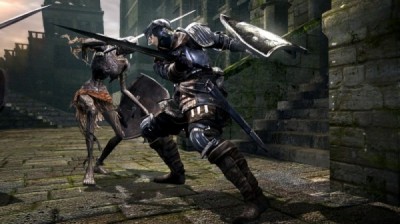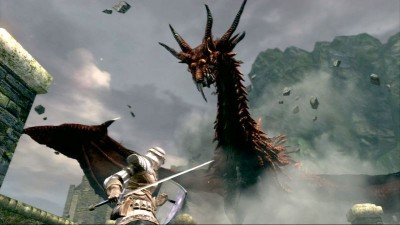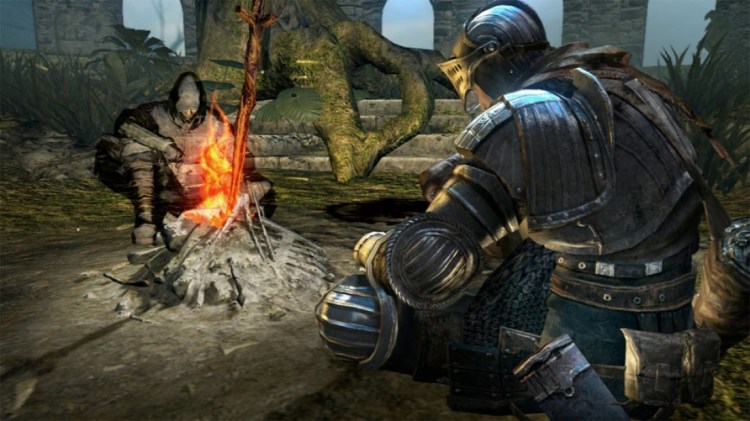
It is dark. I have spent the last two hours stumbling and falling down a seemingly endless series of wooden platforms, facing off against attack dogs and ghouls, and being shot with poison darts. Finally reaching the ground, I find myself in a poisonous swamp, surrounded by giant mosquitoes and spiders. Somehow, I manage to cut a swathe through my enemies, only to be invaded by a dual-cleaver wielding phantom. Standing knee deep in swamp water, and barely able to move, I just manage to defeat this new foe. I struggle on, now poisoned and losing health fast. In the darkness, I see a tunnel, and inside is a bonfire. A safe haven in the gloom. A chance to replenish my health, and most importantly, a checkpoint of sorts. I am yards from the fire when, in a cruel twist of fate, I am invaded again, in retaliation for a previous transgression. This time there is no surviving. The phantom is upon me, and cuts me down where I stand. I must start my descent again. Welcome to the cruel and beautiful world of Dark Souls, one of the year’s big budget fantasy role-playing games created by From Software and published by Namco Bandai Games. While other blockbuster games are getting a lot of attention, this one could well be worth your time.
Dark beginnings
The spiritual successor to the 2009 PlayStation 3 exclusive Demon’s Souls, Dark Souls makes its way onto both Xbox 360 and PS3, bringing with it much of the twisted fantasy look and feel of the previous title. With an understated approach to storytelling, Dark Souls greets the player with a brief and suitably dour cut scene (like a short animated film), followed by a tutorial level of sorts, during which you are pitted against an Asylum Demon the size of house, whilst armed only with a broken sword. This initial encounter sets the tone well for the game, with the realization that it is best to run, and resume battle when in a better position to put up a fight.
 As you progress through the first few hours of the game, small hints are provided to help cope with the bleak world in which you find yourself, but the game never overtly extends a helping hand. In many ways this is the antithesis of popular trends in modern video games. Dark Souls doesn’t provide invisible walls to stop you falling to your death, it doesn’t throw constantly respawning enemies at you, until you reach a checkpoint, and it doesn’t present you with glowing platforms, that will light your passage through the game. Instead Dark Souls is gaming in perhaps its purest form, where a minor mistake can cost you your life, and even the weakest enemy can be a threat, if you approach it without due diligence.
As you progress through the first few hours of the game, small hints are provided to help cope with the bleak world in which you find yourself, but the game never overtly extends a helping hand. In many ways this is the antithesis of popular trends in modern video games. Dark Souls doesn’t provide invisible walls to stop you falling to your death, it doesn’t throw constantly respawning enemies at you, until you reach a checkpoint, and it doesn’t present you with glowing platforms, that will light your passage through the game. Instead Dark Souls is gaming in perhaps its purest form, where a minor mistake can cost you your life, and even the weakest enemy can be a threat, if you approach it without due diligence.
Character Creation
The underlying mechanics to Dark Souls are those of a role-playing game (RPG). Your character, which is initially defined by one of the pre-existing characters at first, can be developed in any number of ways, by investing the souls that you reap when defeating enemies into various categories, such as strength, vitality, intelligence and dexterity. By leveling up certain characteristics, you can design your character to excel at any combat style that you choose, including melee combat, magic or pyromancy.
Running in parallel to this character development is the huge range of equipment that can be found, bought or earned during the game, which will play a huge part in defining your playing style. Most of the weapons in the game can also be upgraded along certain paths, with the use of Titanite, and the kind assistance of blacksmiths. Towards the end of the game, I was regularly swapping the weapons, armor and rings that my character had equipped, to deal with different situations and enemies. This freedom to experiment and develop your in-game character plays a huge part in making them feel like a personal creation, rather than just a generic action-hero. It also helps heighten the emotional impact of the heartbreaking failure and very occasional sublime success that you will experience during the game.
parallel to this character development is the huge range of equipment that can be found, bought or earned during the game, which will play a huge part in defining your playing style. Most of the weapons in the game can also be upgraded along certain paths, with the use of Titanite, and the kind assistance of blacksmiths. Towards the end of the game, I was regularly swapping the weapons, armor and rings that my character had equipped, to deal with different situations and enemies. This freedom to experiment and develop your in-game character plays a huge part in making them feel like a personal creation, rather than just a generic action-hero. It also helps heighten the emotional impact of the heartbreaking failure and very occasional sublime success that you will experience during the game.

